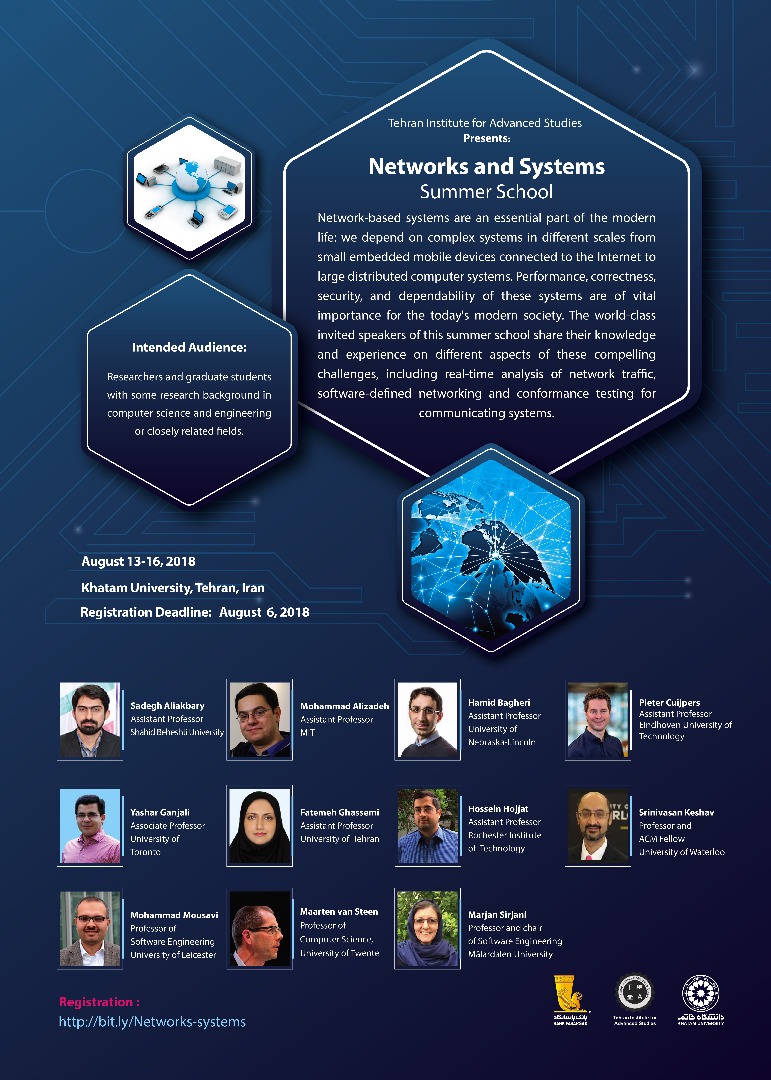
Address: Mollasadra, North Shiraz, Hakim Azam, No 30.
See location on Google map
General Chair
Mohammad Morrovati
Scientific Organization Committee
Hossein Hojjat
Sadegh Aliakbary
Mohammad Reza Mousavi
Local Organization Chair
Maryam Hejazinia
Overview
Network-based systems are an essential part of the modern life: we depend on complex systems in different scales from small embedded mobile devices connected to the Internet to large distributed computer systems. Performance, correctness, security, and dependability of these systems are of vital importance for the today’s modern society. The world-class invited speakers of this summer school share their knowledge and experience on different aspects of these compelling challenges, including real-time analysis of network traffic, software-defined networking and conformance testing for communicating systems.
Target Audience
The intended audience of the summer school are researchers and graduate students with some research background in computer science and engineering or closely related fields.
Speakers
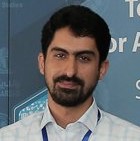
SADEGH ALIAKBARY
SHAHID BEHESHTI UNIVERSITY
Title of Presentation:
Adaptive Modeling of Complex Networks
Sadegh is an assistant professor in the Computer Science and Engineering department of Shahid Beheshti University. He has received his PhD from Sharif University of Technology. His research interests includes complex networks, network modeling, social network simulation, network mining, and data science.
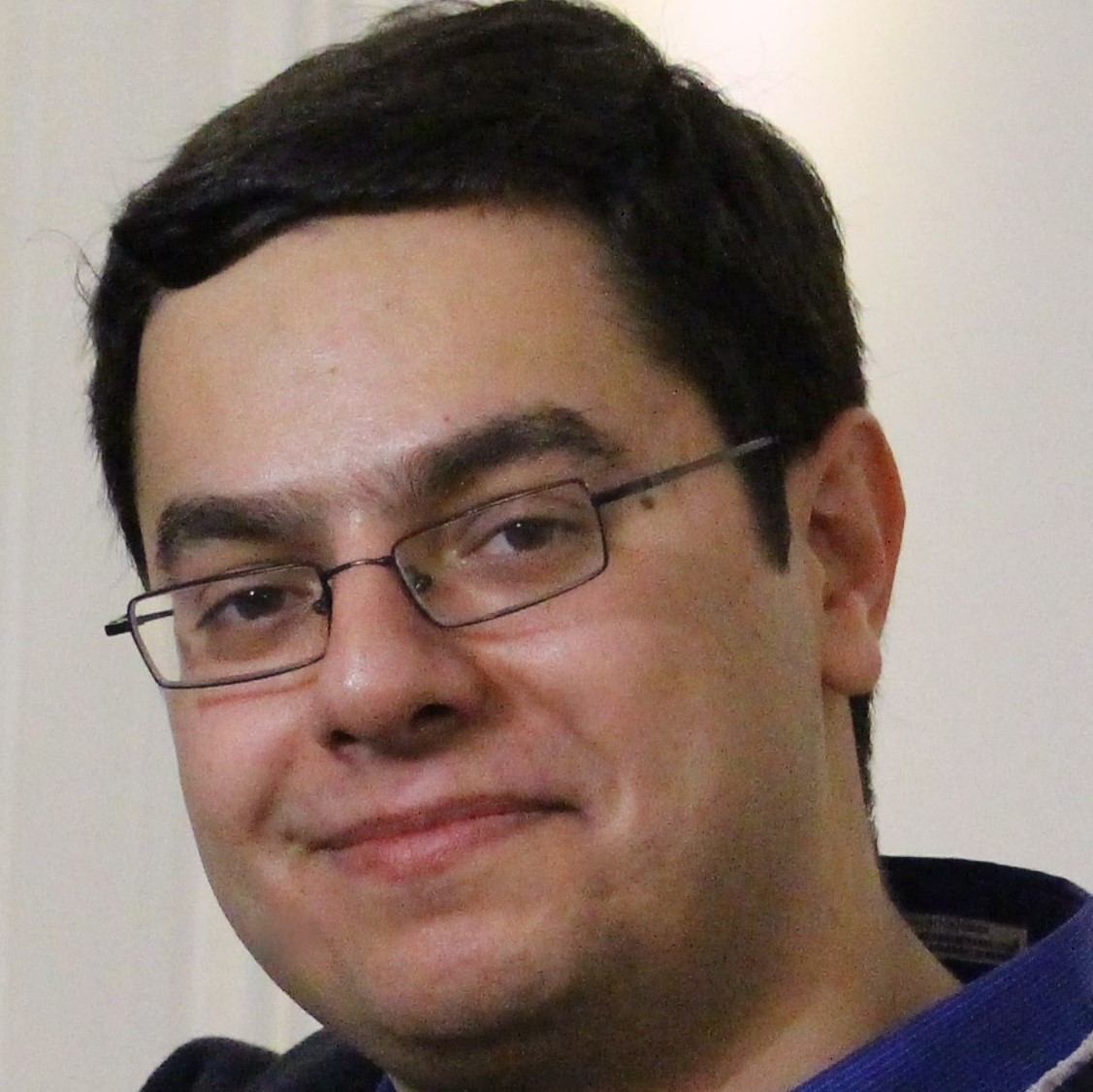
MOHAMMAD ALIZADEH
MIT
Title of Presentation:
Towards Network Systems that Improve with Experience
Mohammad Alizadeh is an Assistant Professor in the Department of Electrical Engineering and Computer Science (EECS) at MIT, and a member of the Computer Science and Artificial Intelligence Laboratory (CSAIL). He completed his graduate studies at Stanford University, earning his Ph.D. in electrical engineering in 2013, and then spent two years at Insieme Networks (a datacenter networking startup) and Cisco before joining MIT. Mohammad’s research interests are in the areas of computer networks and systems. His current research focuses on network protocols and algorithms for large-scale datacenters, programmable switching architectures, and learning-based networked systems. Several solutions from Mohammad’s research have been implemented in open-source and commercial systems (e.g., DCTCP in Linux and Windows, CONGA in Cisco’s flagship datacenter switching products) and have been adopted by industry standards. Mohammad is a recipient of the NSF CAREER Award (2018), SIGCOMM Rising Star Award (2017), Alfred P. Sloan Research Fellowship (2017), Google Faculty Research Award (2016 and 2018), and multiple best paper awards.
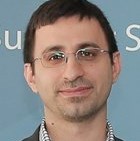
HAMID BAGHERI
UNIVERSITY OF NEBRASKA-LINCOLN
Title of presentation:
Practical, Lightweight Formal Analysis of Software Systems
Mohammad Amin Sadeghi completed his PhD at the University of Illinois at Urbana-Champaign. He is currently a faculty member in Computer Engineering at the University of Tehran. He is interested in cryptocurrencies and their applications.

PIETER CUIJPERS
EINDHOVEN UNIVERSITY OF TECHNOLOGY
Title of presentations:
Ethernet TSN, and the worst-case response time of credit-based shaping
Pieter Cuijpers is an Assistant Professor in the System Architecture and Networking Research group at Eindhoven University of Technology (TU/e). He received his MSc in Electrical Engineering and his PhD in Computer Science from TU/e in 2000 and 2004 respectively. After developing a process algebra for hybrid systems (HyPA), his current research interests include the application of quantitative formal methods to cyber physical systems, with a focus on performance analysis and scheduling of distributed embedded systems. Important techniques that play a role in this are:
max-plus algebra and dataflow modeling
event-based modeling and simulation
axiomatic reasoning about execution intervals
Currently, Pieter is supervising three PhD students, in the rCPS project on data-intensive sensing (Jingyue Cao), the Awesome project on evolution of software components (Nan Yang), and the RWS project on a platform for sharing mobility data (Jeroen Redegeld).
My visit to Iran in the context of the Energy and Environmental Economics Summer School left a very strong and positive impression on me of how seriously the education of future generations is taken in the new Tehran Institute for Advance Studies. They must be praised for such a noble and important initiative.
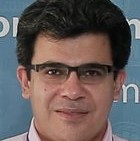
YASHAR GANJALI
UNIVERSITY OF TORONTO
Title of Presentation:
Evolution of the Internet: Past, Present, and The Future
Yashar Ganjali is an associate professor of computer science at the University of Toronto. He is a member of Computer Systems and Networks Group. He received his BSc in Computer Engineering from Sharif University of Technology, and his MSc in Computer Science from University of Waterloo. He completed his PhD in Electrical Engineering at Stanford University. His PhD dissertation studied the buffer sizing problem in Internet core routers, and showed the possibility of reducing buffer sizes from millions of packets to just a few packets in Internet core routers.
Dr. Ganjali’s research interests include packet switching architectures/algorithms, software defined networks, data center networking, congestion control, network measurements, and online social networks. He has received several awards for his research including best paper award in Internet Measurement Conference 2008, best paper runner up in IEEE INFOCOM 2003, best demo runner up in SIGCOMM 2008, first and second prizes in NetFPGA Design Competition 2010, Cisco Research Award, and a Distinguished Faculty Award from Facebook.
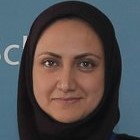
FATEMEH GHASSEMI
UNIVERSITY OF TEHRAN
Title of Presentation:
Behavioral Model Identification and Classification of Network Applications
Fatemeh Ghassemi has received her Ph.D in Software Engineering from Sharif university of technology in 2011, and in Computer Science from Vrije Universiteit of Amsterdam in 2018. She is an assistant professor at University of Tehran since 2012, supervising the Formal Methods laboratory. Her research interest includes formal methods in software engineering, protocol verification, model checking, process algebra, software testing, and wireless systems.
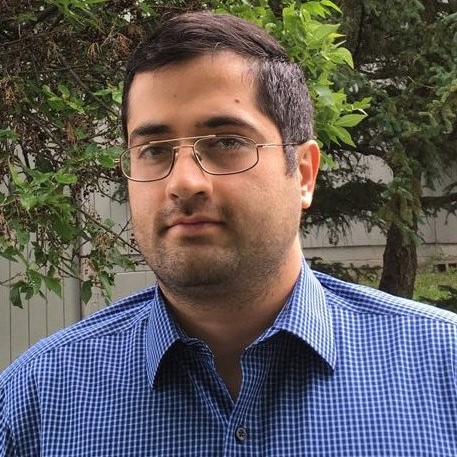
HOSSEIN HOJJAT
ROCHESTER INSTITUTE OF TECHNOLOGY
Title of Presentation:
Software Synthesis for Networks
Hossein Hojjat is an assistant professor in the Computer Science department at the Rochester Institute of Technology (RIT). Before joining RIT, he was a postdoctoral researcher at Cornell University. He earned a PhD in Computer Science from EPFL in 2013. His research interests center on program synthesis and verification.
SRINIVASAN KESHAV
UNIVERSITY OF WATERLOO
Title of Presentation:
Research Methods in Networks and Systems
Srinivasan Keshav is a Professor of Computer Science at the University of Waterloo. He received a B.Tech in Computer Science and Engineering from IIT Delhi in 1986 and Ph.D. in Computer Science from the University of California, Berkeley in 1991. He was subsequently an MTS at AT&T Bell Labs and an Associate Professor at Cornell. In 1999 he left academia to co-found Ensim Corporation and GreenBorder Technologies Inc. He has been at the University of Waterloo since 2003, holding first a Canada Research Chair and then the Cisco Chair in Smart Grid. His honours include being named ACM Fellow and IEEE Senior Member, two Test of Time awards from ACM SIGCOMM, and best paper awards at ACM SIGCOMM, MOBICOM, and eEnergy. He is the author of two graduate textbooks on computer networking and has served both as Chair of ACM SIGCOMM and as Associate Dean of Graduate Studies in the Faculty of Mathematics, University of Waterloo.
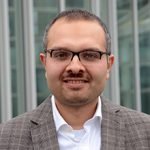
MOHAMMAD MOUSAVI
UNIVERSITY OF LEICESTER
Title of Presentation:
Conformance Testing Networked Applications: Theory and Practice
Mohammad got his bachelors and masters degree in Computer Engineering in 1999 and in Software Engineering in 2001, respectively, both from Sharif University of Technology, Iran and his Ph.D. in Computer Science from Eindhoven University of Technology, The Netherlands in 2005. Since then he held positions at Reykjavik University (postdoctoral researcher), Eindhoven University of Technology (assistant and associate professor), Delft University of Technology (guest faculty member), Halmstad University (professor of Computer Systems Engineering), and Chalmers / University of Gothenburg (guest professor of Software Engineering). He has had various leadership positions in his past appointments, such as managing educational programs, leading research teams, and leading research-centre-building initiatives. Mohammad’s main research area is in model-based testing, particularly applied to software product lines and cyber-physical systems. He has been leading several research initiatives and industrial collaboration projects on healthcare and automotive systems their validation, verification, and certification.

MAARTEN VAN STEEN
UNIVERSITY OF TWENTE
Title of Presentation:
Conformance Testing Networked Applications: Theory and Practice
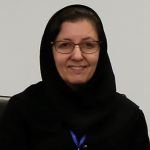
MARJAN SIRJANI
MÄLARDALEN UNIVERSITY, REYKJAVIK UNIVERSITY
Title of Presentation:
Building Dependable Cyberphysical Systems using Timed Actors
Marjan Sirjani is a Professor and chair of Software Engineering at Mälardalen University, and the leader of Cyber-Physical Systems Analysis research group. She is also a part-time Professor at School of Computer Science at Reykjavik University. Her main research interest is applying formal methods in Software Engineering. She works on modeling and verification of concurrent, distributed, and self-adaptive systems. Marjan and her research group are pioneers in building model checking tools, compositional verification theories, and state-space reduction techniques for actor-based models. She has been working on analyzing actors since 2001 using the modeling language Rebeca (http://www.rebeca-lang.org). Rebeca and its extensions are designed to bridge the gap between model-based software development and formal analysis, and has been used for analyzing different network and system applications. Her research is now focused on safety assurance and performance evaluation of self-adaptive systems, in which she is collaborating with Ptolemy group at UC Berkeley. Marjan has been the PC member and PC chair of several international conferences including SEFM, iFM, Coordination, FM, FMICS, SAC, FSEN, and guest editor for special issues of the journals Science of Computer Programming and Fundamenta Informaticae. Before joining academia as a full-time faculty, she has been the managing director of Behin System Company for more than ten years, developing software and providing system services. Marjan served as the head of the Software Engineering Department of School of Electrical and Computer Engineering at the University of Tehran prior to joining the School of Computer Science at Reykjavik University in 2008.
Schedule
9:00-10:30 Yashar Ganjali; “Evolution of the Internet : Past, Present, and The Future”
11:00-11:45 Yashar Ganjali; “Evolution of the Internet : Past, Present, and The Future”
12:00-12:30 Yashar Ganjali; “Evolution of the Internet : Past, Present, and The Future”
14:00-15:00 Mohammad Mousavi; “Conformance Testing Networked Applications: Theory and Practice ”
15:15-16:15 Mohammad Mousavi; “Conformance Testing Networked Applications: Theory and Practice ”
16:30-17:00 Mohammad Mousavi; “Conformance Testing Networked Applications: Theory and Practice ”
9:00-10:00 Hossein Hojjat; “Software Synthesis for Networks”
10:30-11:15 Hossein Hojjat; “Software Synthesis for Networks”
11:30-12:15 Hossein Hojjat; “Software Synthesis for Networks”
14:00-15:00 Sadegh Aliakbari; “Adaptive Modeling of Complex Networks”
15:30-16:30 Fatemeh Ghassemi; “Behavioral Model Identification and Classification of Network Applications”
17:00-18:00 Srinivasan Keshav (on Skype); “Research Methods in Networks and Systems”
9:00-10:00 Hamid Bagheri; “Practical, lightweight formal analysis of software systems”
10:30-11:30 Marjan Sirjani; “Building Dependable Cyberphysical Systems using Time Actors”
11:45-12:15 Marjan Sirjani; “Building Dependable Cyberphysical Systems using Time Actors”
14:00-15:00 Panel (Hamid Bagheri, Hossein Hojjat, Mohammad Mousavi, Marjan Sirjani, Maarten van Steen, Moderator: Sadegh Aliakbari)
15:30-16:30 Mohammad Alizadeh (on Skype); “Towards Network Systems that Improve with Experience”
16:30-18:30 Social Event
9:00-10:00 Maarten van Steen; “Why are distributed systems so complicated and what can we do about it?”
10:30-11:15 Maarten van Steen; “Why are distributed systems so complicated and what can we do about it?”
11:30-12:15 Maarten van Steen; “Why are distributed systems so complicated and what can we do about it?”
14:00-15:00 Pieter Cuijpers; “Ethernet TSN, and the worst-case response time of credit-based shaping”
15:15-16:15 Pieter Cuijpers; “Ethernet TSN, and the worst-case response time of credit-based shaping”
16:30-18:00 Pieter Cuijpers; “Ethernet TSN, and the worst-case response time of credit-based shaping”
